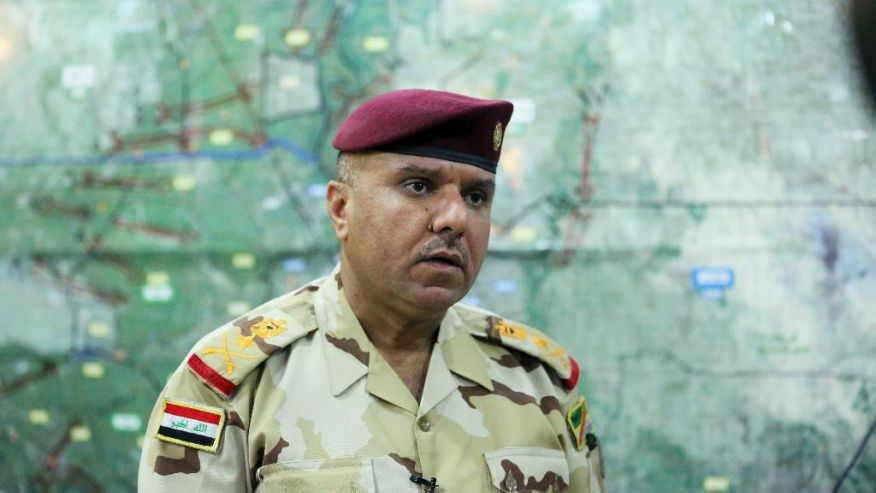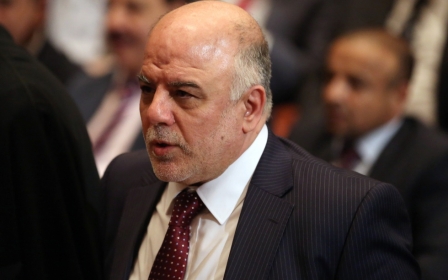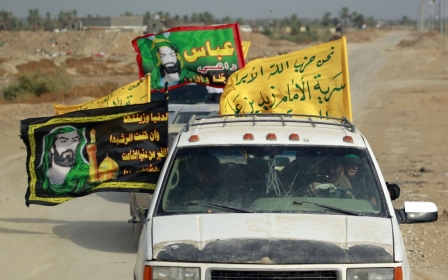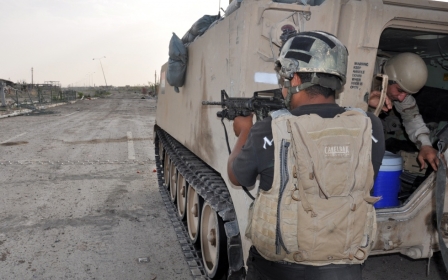Kidnappings greater threat to Baghdad than Islamic State: top official

The rise in the number of kidnappings poses a greater threat to Baghdad's security than the Islamic State (IS) group, the Iraqi capital's top security official said on Tuesday.
"Kidnapping cases have increased recently as a result of the security mobilisation and military efforts to fight terrorism outside the city," Lieutenant-General Abdelamir al-Shammari said.
"Wrongdoers have exploited this state of affairs to start carrying out abductions, mostly for personal gain but sometimes motivated by sectarianism," he said in a statement.
Dozens of kidnappings take place every week in Baghdad, the Arab world's second largest capital after Cairo.
While some abductions are a direct result of the sectarian tension that has grown since IS took over part of Iraq this year, others are the work of extortion gangs that have prospered in the confusion.
In most recent cases, victims were released upon payment of a ransom, according to police.
"They are exploiting the wide availability of military equipment, vehicles and weapons," Shammari said.
As the government has lost control over large portions of the country in the wake of an offensive by IS and allied Sunni insurgents, Prime Minister al-Maliki has been forming new security forces made up of militias and is taking little or no action as they kill people, Human Rights Watch found.
The loss in June to IS of swathes of territory, including the key cities of Mosul and Tikrit, led the top religious leader of Iraq's Shiite majority, Ayatollah Ali al-Sistani, to call on civilians to join the security forces.
His appeal led to mass enrolment in Shiite militias that have both played a key role in stemming the IS advance but been accused of criminal and sectarian abuses in the process.
Baghdad has come under the growing sway of the militias since the collapse of Iraq’s army and security forces in June, when the IS armies took over large swaths of territory in the north.
“It is natural for Baghdad to be witnessing an upsurge in security and the emergence of kidnapping and organized crime,” security analyst, Imad Alo, told the Iraq daily, Azamman.
“There are groups who have been utilizing Sistani's fatawa (religious decree) as a cover to implement a criminal agenda. There is a relation between the resurfacing of criminal gangs and weakness of the state,” he said.
Abductions were commonplace in Baghdad during the British and American invasion of Iraq in 2003, particularly in the years from 2004-2010.
Since then relative calm returned to the Iraqi capital in the past few years with a drastic drop in violent crime until early this year when IS jihadists initially invaded areas of the western Province of Anbar and in June invaded large swathes of north-eastern Iraq, occupying major cities.
Victims or their families report that the kidnappers often use text messages to make their demands, and that the amount asked is usually subject to negotiation.
The agreed ransom is usually between $20,000 and $30,000 – a huge sum for anyone holding a job
"Our view is that this criminality has a deep effect on general security and is currently a bigger threat (in Baghdad) than terrorist activity," Shammari said.
He said Prime Minister Haider al-Abadi had ordered the creation of a special anti-kidnapping unit within the Baghdad Operations Command.
The crisis cell has been active for a few days and Shammari said seven kidnapping rings had already been busted and several victims released.
In one recent high-profile case, members of the Asaib Ahl al-Haq Shiite militia abducted a relative of the deputy prime minister, according to senior security sources.
Many kidnappings are also carried out by criminals posing as members of the security forces or of one of the myriad militia groups operating in Baghdad.
Sectarian killings have markedly increased since IS took over Mosul on June 10. “Sunnis are a minority in Baghdad, but they’re the majority in our morgue,” a doctor working in the Health Ministry told Human Rights Watch. He and three other doctors said the number of Sunnis in the morgue who died violent deaths had increased significantly since June 10.
Displaced Iraqis surpasses 2 million
The ongoing conflict in Iraq has pushed the number of internally displaced people nationwide to over 2 million in 2014, according to the International Organization for Migration, or IOM.
Nineveh in northern Iraq has suffered the greatest population loss with more than 940,000 people fleeing the town due to clashes between the Iraqi army and the Islamic State of Iraq and the Levant, IOM spokesperson Joel Millman told reporters in Geneva on Tuesday.
Iraq’s western province of Anbar has suffered the second largest displacement with more than 540,000 people, Millman said.
The Kurdish Regional Government is hosting the majority of the displaced, while the central region of Iraq is hosting around 45 percent of the displaced, he added.
An international coalition led by the U.S. has staged numerous airstrikes against ISIL militants who have taken control of large swathes of territory in Iraq and Syria since mid-June.
New MEE newsletter: Jerusalem Dispatch
Sign up to get the latest insights and analysis on Israel-Palestine, alongside Turkey Unpacked and other MEE newsletters
Middle East Eye delivers independent and unrivalled coverage and analysis of the Middle East, North Africa and beyond. To learn more about republishing this content and the associated fees, please fill out this form. More about MEE can be found here.




